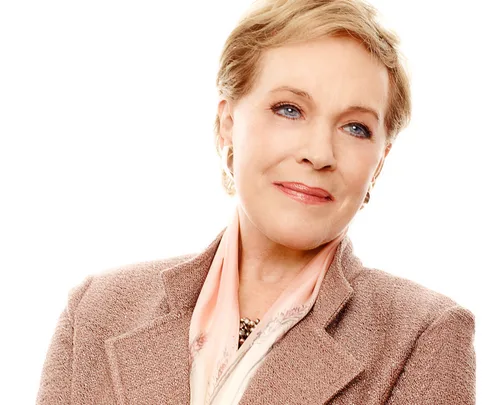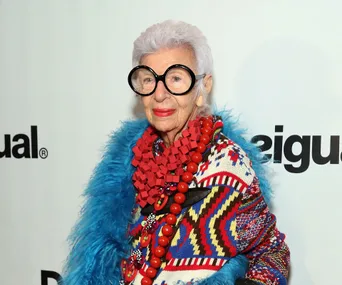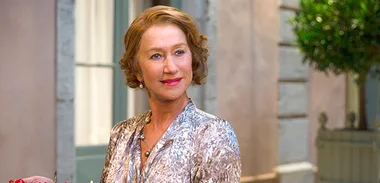Imagine Julie Andrews atop a mountain, singing… no, not that song but “I am 60, going on 70… ” Sounds possible, right? Yet Julie is not 60 going on 70 – and you couldn’t even say she is 70 going on 80, for this year Julie marks the start of her ninth decade, celebrating her 80th birthday on October 1.
Hard to believe, yet it must be true because Julie – she of the golden bob and gorgeous voice – was 30 when she made what is perhaps the sweetest musical of all time, The Sound of Music, and that was 50 years ago this year.
“I keep thinking it must be a trick,” says Julie during an interview with The Australian Women’s Weekly in her hotel room on Manhattan’s Park Avenue, “and any moment somebody will say, no, it was only 30 years ago; because how can I be approaching 80?”
She can because that is what happens, although only if we are lucky. We tend to forget, as the ignominies of age descend upon us, what a privilege it is to live a long life. Not everyone gets to do it and fewer still live long enough to receive what Julie has now been granted: the reverence of a humbled next generation.
More admired now than ever, Julie received a standing ovation during a special tribute to The Sound of Music at this year’s Academy Awards. When Julie appeared on stage, it was as though a seraph had descended, complete with floor-length cape.
“Oh, it was lovely,” says Julie, although were you to ask whether fame is one of Julie’s favourite things, she would certainly say no. That honour goes to family – not the one into which she was born, but the one she bolted together, against the odds, with her now departed husband Blake Edwards, two of his children, one of her own and two little girls they adopted from a Vietnamese orphanage in those terrible, chaotic days just before Saigon fell.
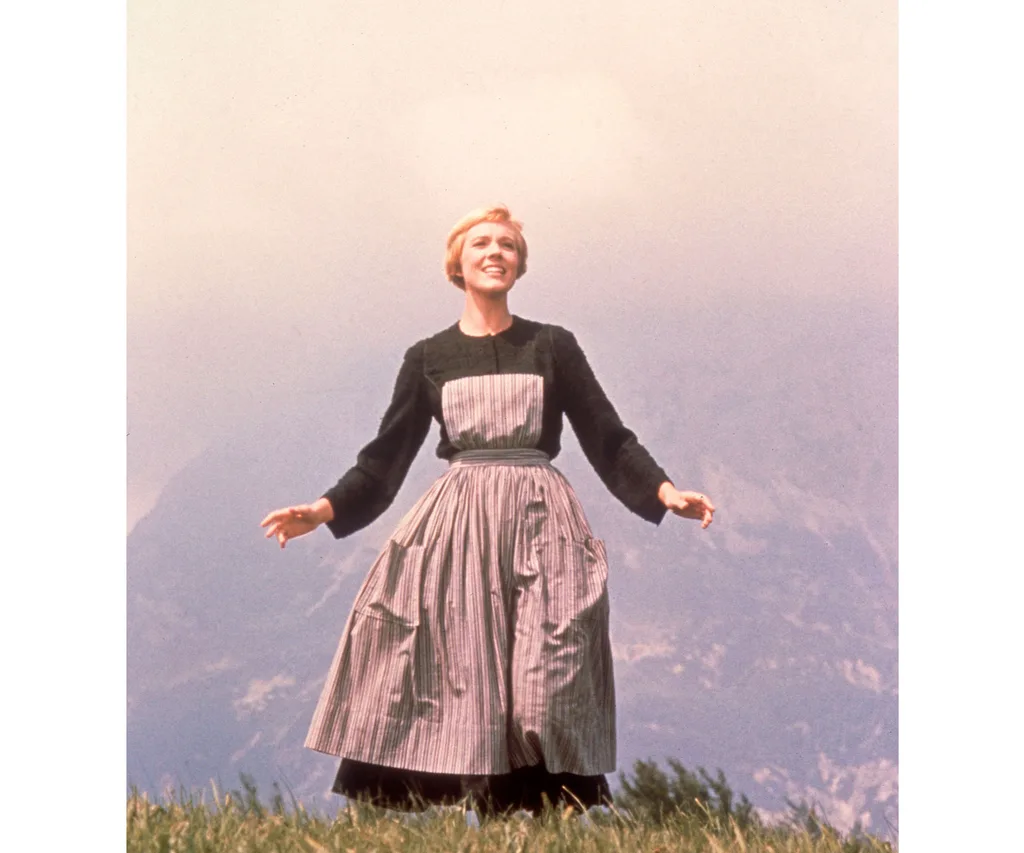
Julie Andrews as Maria von Trapp in The Sound of Music, one of the most successful films ever.
Where you start in life has nothing to do with where you end up. Julie Andrews was born Julia Wells shortly before World War II in England and, to this day, she remembers “growing up in the war and the Blitz”. Her parents divorced when she was four and her mother later announced that her father wasn’t her father at all. She was the product of a fling. If that was not enough, Julie’s mother then got remarried, this time to a musician, Ted Andrews, an unmannerly alcoholic who tried more than once to get into Julie’s bed.
By the time she was 10, Ted had also encouraged his inordinately talented stepdaughter – at the peak of its power, Julie’s voice had a four-octave range – onto the road, singing for returning troops. She would stand on an apple box to reach the microphone and audiences were enchanted.
By 13, Julie had sung at a Royal Command performance (King George VI was supposed to attend that day but was ill; Julie sang instead for a young Elizabeth, who is now the Queen).
From there, Julie joined the BBC and London’s West End, before heading to Broadway to play My Fair Lady. Then came the role for which she would win an Academy Award, Mary Poppins (Julie was pregnant with her first child when she was cast, but Disney said, “We will wait for you”) and then, in 1965, out came The Sound of Music, and Julie was suddenly the biggest star in the world.
“It was a very, very difficult time,” she tells The Australian Women’s Weekly over perfect cups of tea and cucumber sandwiches in a quiet room at the Regency Hotel. “[Success] really did rattle my brains. Lucky my mother always told me never to get a big head.”
The Sound of Music is one of the most successful films ever. Many Kiwi children have grown up reciting the lyrics of Do-Re-Mi. It is a magnificent, if terribly sentimental, celebration of everyone’s favourite things: love, honour, family and courage.
The story was based on Maria von Trapp, a little girl born on a train en route to Vienna, Austria, who lost both parents before the age of seven and who made what Julie describes as a “sudden and surprising” decision at 18 to enter a nunnery, only to find herself unsuited to a life of prayer and solitude (“How do you solve a problem like Maria? How do you catch a cloud and pin it down?”).
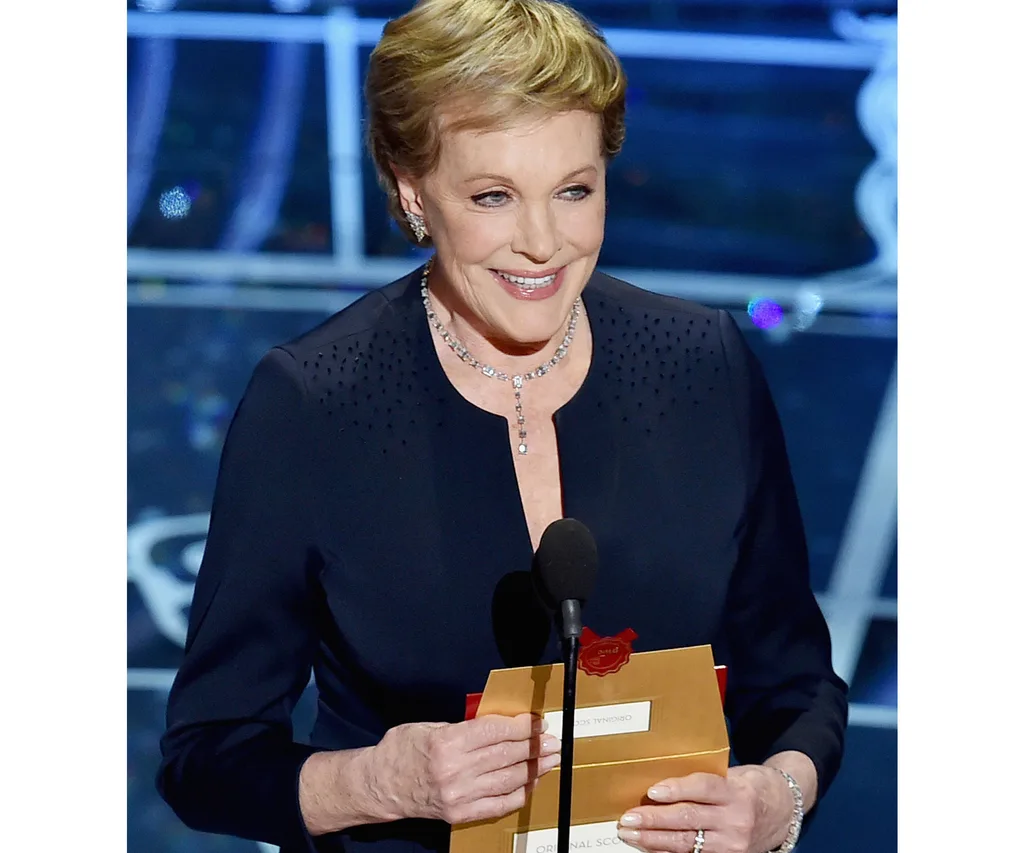
Julie speaking at the Academy Awards.
The film won five Academy Awards, including Best Picture. And while it is impossible to imagine anyone else in Maria’s role, Julie says she was initially reluctant to take it. “I had seen the Broadway show and thought a film might be too sentimental,” she says.
Julie was married at the time to set designer Tony Walton. They had been childhood sweethearts (Tony was quoted as saying he saw Julie playing an egg in a school version of Humpty Dumpty and promptly fell in love). Their daughter, Emma, was 18 months old. The director, Robert Wise, agreed to have the little one on set, so there Emma sat, “wondering what the heck Mummy was doing”.
“As a mother, my children have always come first,” Julie says, “and even though I’ve always been a working woman, I have also tried to have them with me, as often as I could.” The juggle was not easy, “but there were other children [playing Maria’s children] on set. I tried to make things silly and funny, so we all had a good time.”
By the time the film wrapped, Julie and her husband were formally separated (they remain “great chums”). By the time it came out, she was dating Blake Edwards, the director responsible for Breakfast at Tiffany’s.
Blake didn’t know Julie all that well before they started dating. In fact, he had only seen her in Mary Poppins and apparently told friends she was “so sweet she probably has violets between her legs”. Julie promptly sent him a bunch of purple flowers, which was terribly cheeky, but hey, this was the 1960s. The romance was on, and isn’t it funny how life mirrors art? There was Julie playing a stepmother – Maria – who had to win over the von Trapp children on screen, and there was Julie thinking of ways to win over Blake’s two children in real life.
“I still went through a lot of stepmothering. And it was rarer [than today] because divorce was rarer and there was an idea that stepmothers must be wicked. But Maria, in the film, turned out to be not so wicked,” Julie says. “Not even in real life, from what I gather. She brought a quality of life to the children that they hadn’t had. I think they had a lot of nannies. She brought fresh air and fresh life into the family.
“But it is difficult,” she continues. “And besides being a stepmother, I’m an adoptive mother, too. I have my natural-born daughter and Blake’s two children, and then we adopted two children – can you imagine the hodge-podge?”
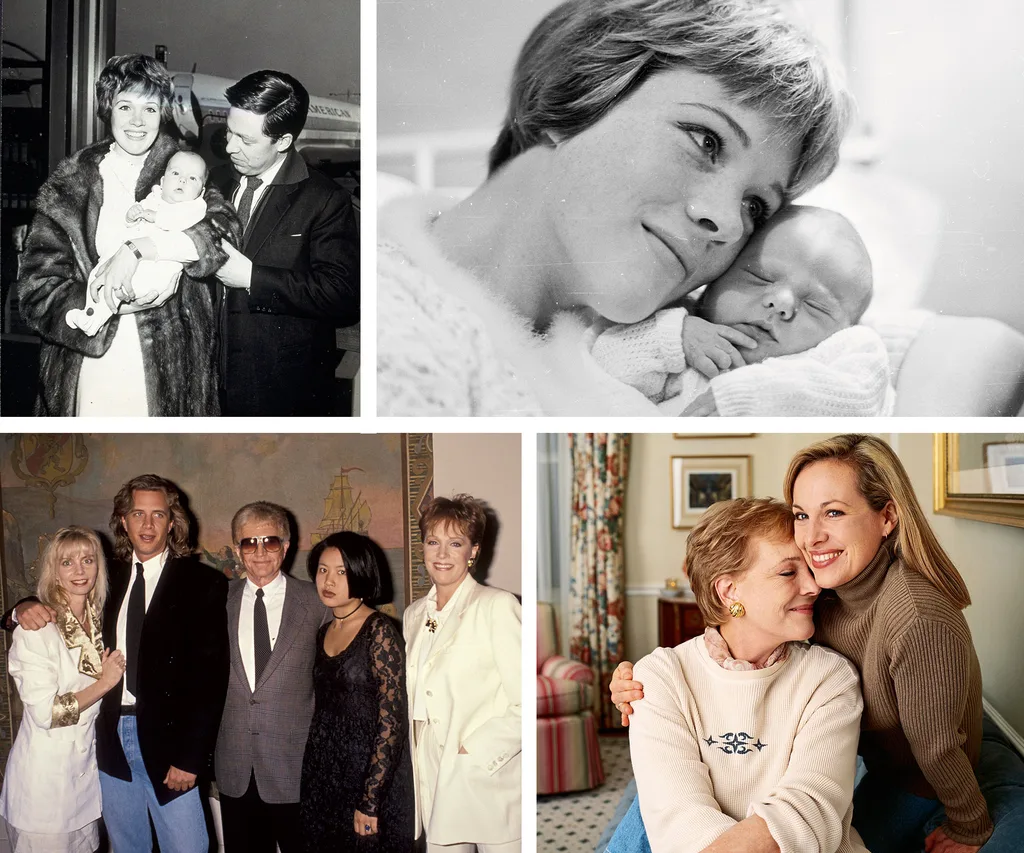
Clockwise from top left: Julie, first husband Tony Walton and Emma; with newborn Emma; Emma hugs her mum; Julie and family in 2001.
Julie adopted her daughters, Amy Leigh and Joanna Lynne, at two months and five months old, from an orphanage in Vietnam just as US troops were being airlifted out after a long, miserable war.
“We wanted a child and it hadn’t happened,” she says. “Amy came into our lives and it was wonderful. Then Saigon began to fall and within three months, we had another one. We said [to the orphanage where Amy had come from], ‘We know you are not going to be able to do this for long. Once the South falls [adoptions will cease] so if you care to send us another one, please do.’ So suddenly Joanna was with us and they were not sisters, but like sisters.”
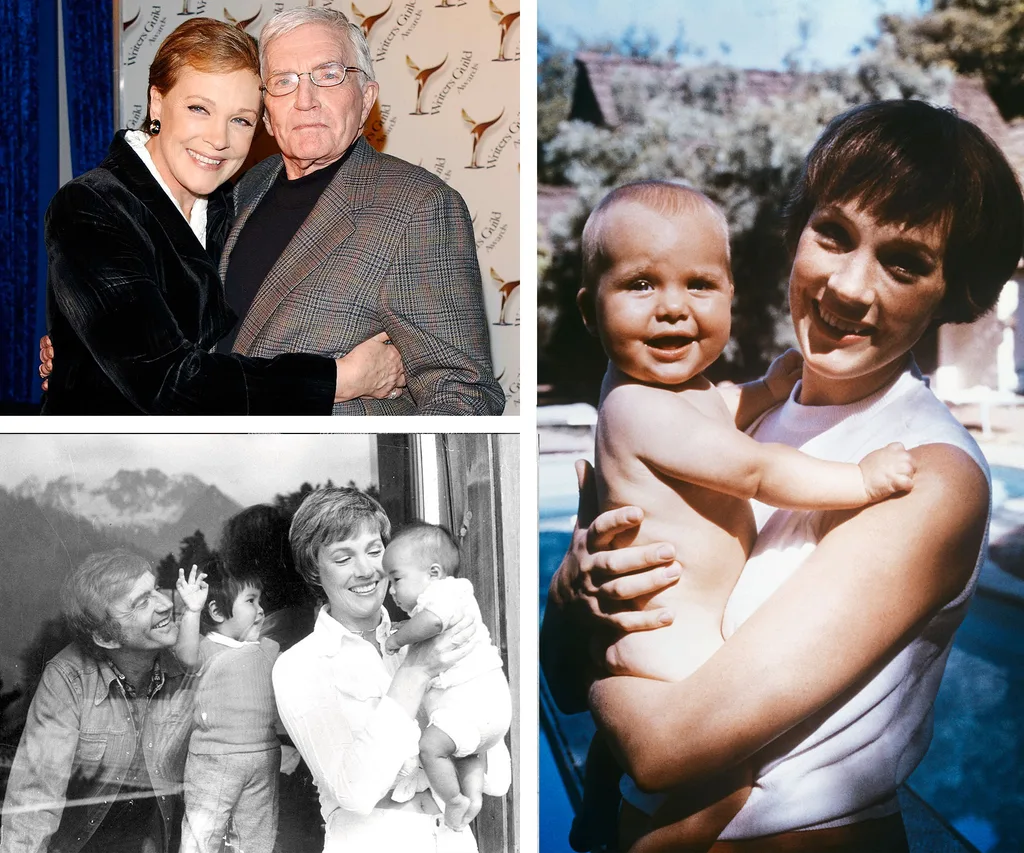
Clockwise from top left: Julie with Black Edwards; Julie and Emma, 1965; Blake, Julie and their adopted daughters.
Early video footage of Julie playing with her girls on a Malibu beach shows a woman devoted to her new daughters. The road ahead wasn’t trouble-free, for reasons many adoptive parents will instinctively understand: Julie and Blake had in mind what ‘we could do for the children’ and not what the children would have to go through, adapting to life in America. “But,” says Julie, “the love kept us going.”
Julie’s decision to adopt two infants led directly to her decision to step down, if not entirely away, from her film career.
“I wanted to be there,” she says. “To make a proper protein breakfast for them before school in the morning. To go to parent-teacher interviews. It is important. I do admire women who manage to do both. I tried and it is extremely difficult.” (Of her mum, Emma once said, “She’s an even better egg than you would imagine her to be.”)
One of the most touching lines in The Sound of Music is where Captain von Trapp hangs his head and acknowledges that he does not know his children. “That has been a problem for men in the past,” Julie says. “Now, not as much. I think there is a lot more sharing of parenting. More give and take in marriages. It used to be solely the mother.
“In my case, Blake was hands-on. One wonderful phase was when I was offered a TV series, very lucrative, all sorts of benefits, but we had five children. He said, ‘Honey, I will stay home and write. You go and do that. It will be okay.’ And do you know, my house was never better run. I have never felt so redundant.”
“I would come home and say, ‘Don’t forget Geoff [Blake’s son] has a dental appointment.’ He would say, ‘Honey, it’s fine. I’ve got it.’ Or I would come home, wiped out from work, and he would say, ‘Let me tell you about your children’s day.’ We laughed about it and we developed a healthy respect for the other role. But I was never so grateful as when it went back to what people [used to say] was normal.”
Then, just as Julie was ready to resume a full-time career, her voice was destroyed during a throat operation. She sued and won. Asked “How is the voice?”, she sighs and says, “Well, it isn’t. There isn’t a voice. Not a singing voice. It is gone.”
The loss coaxed Julie into other fields, including writing children’s books with her daughter Emma.
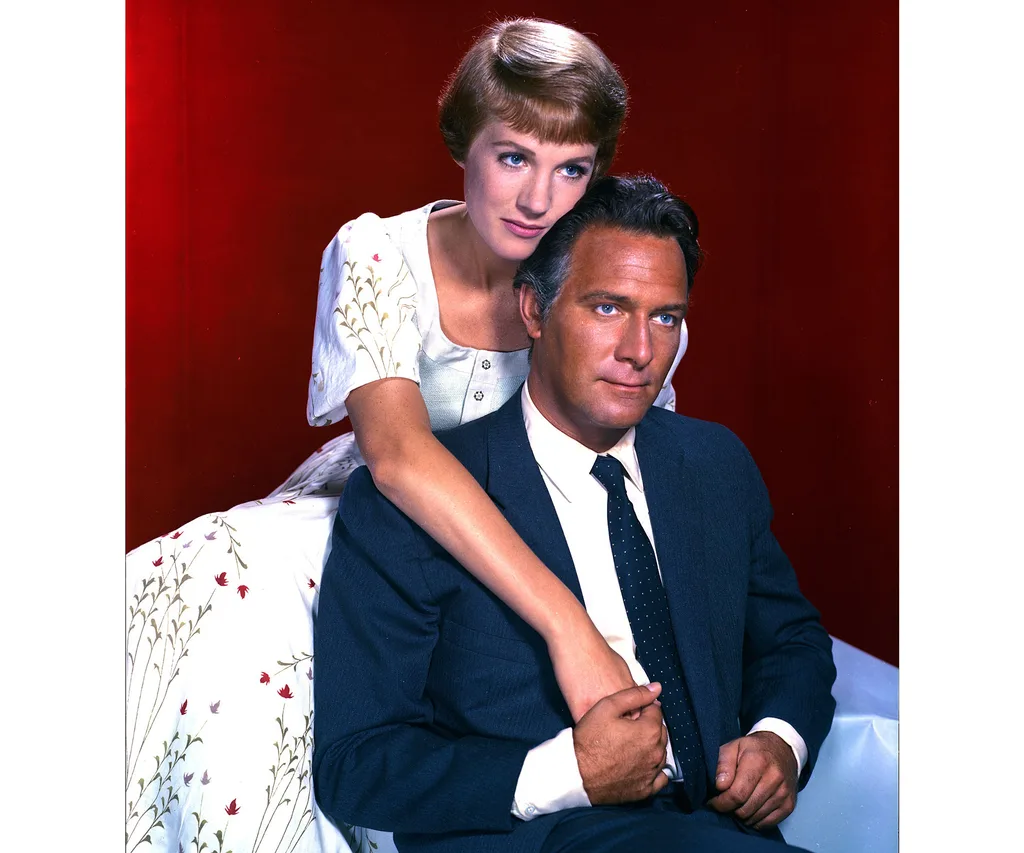
Still great friends: Julie Andrews and Christopher Plummer.
Celebrity, she says, is very difficult. “Before Sound of Music, I was having a lovely time. I was learning my craft. Suddenly, [the films] were released and it was an assault. I defy anyone to handle it gracefully and well. The amazing thing is, after the Academy Awards, for the next three or four days, I couldn’t go anywhere. It was like I had gone back [in time]. It was the same feeling. That small appearance and everybody wanted to know you again. I had forgotten how hard that was.”
Her The Sound of Music co-star, Christopher Plummer, now in his 80s, did not attend the event, telling reporters, “It’s her movie.” He has long been seen as ornery about The Sound of Music, once describing the film as “the sound of mucus” because audiences get so teary in response to all the saccharinity.
Julie says she urged him to attend and he refused but, she says, “I accept it. I asked him and he said he couldn’t. He said he had something else to do. He enjoys playing the curmudgeon. He put [the film] down at the beginning, maybe because he was a little nervous about doing a musical. He was a legitimate Shakespearean actor and perhaps he thought it would do him harm. He took a great gamble and now he says, ‘What an idiot I was to put it down.’” The two remain friends – “Oh my God, yes, indeed we do!”
Julie’s recent work has included voicing the Queen in the Shrek series and Gru’s Mum in Despicable Me. Yet, when asked whether she has worked as often as she would have liked, Julie says, “No. And that is because I haven’t been able to find work that I wanted to do.”
What then would Julie make of Russell Crowe’s observation in The Australian Women’s Weekly that women of any age can act, provided they give up trying to be sirens?
“My basic feeling is that is not quite right,” she says, tactfully. “We are not quite equal yet, in terms of male versus female roles. We are close. Look at Julianne Moore, who won the Oscar this year [for Still Alice]. Great. Her choices are amazing. And she is a lovely human being. It is getting better, but we are certainly not there. When you are younger, you take what is handed to you. You are starting your career, learning your craft, you may even be one of the flavours of the month if you are lucky.” As time goes by, actresses – like actors – yearn for meatier roles, which are few and far between.
Of course, it isn’t possible to live a long life without loss and Julie’s most recent was devastating – her heart was broken when Blake died, aged 88, in 2010.
“I am still processing it,” she says, “and it is difficult. And mourning… well, some people get rid of it all at once, tear their clothing, weep and weep, and with others, it comes out a little at a time. I seem to be one of the latter.”
Meanwhile, daughter Emma is now 52 going on 53, which Julie also finds hard to believe. “One minute, they are up to your hip and next they are grown women in their own right,” she says, “and I tell you, it goes like a shot.”
With that in mind, what advice would Julie give to women still up to their armpits in the juggle?
“Don’t wish it away,” she says, “because it goes so fast. I would also say, stay curious. Whatever you do in life, develop a sense of awe and wonder. Then you will never be bored.”
Words by: Caroline Overington
Photos by: Getty Images, Corbis, Snapper Media, Michel Arnaud/Corbis Outline and Austral.
